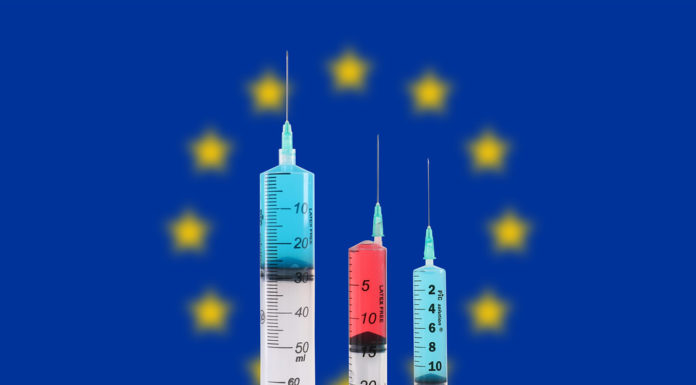By Rachid Benali, President of Moroccan agricultural export association COMADER (Confédération marocaine des opérateurs du secteur agricole)
Food security and price stability are taken as a given in Europe. Even amidst current crises, it is fairly natural to draw that conclusion. Then even if the EU is able to produce or source most of its food, keeping prices stable and citizens fed requires adequate planning. Now more than ever. To address the challenges ahead, the EU should work with international partners to help deliver food to European citizens. This should start by looking to the South.
A recent study by the EU Commission shows how EU food exports have risen by 14% in the first 7 months of 2022, compared to the previous year. Visiting a supermarket may give a reassuring feeling: even after Russia’s invasion of Ukraine, European consumers have roughly the same choice and abundance of agri-food products. Yet, statistics are clear. Throughout the EU, food prices went up by 17% compared to April 2022. This affects basic food citizens consume on a regular basis: sugar now costs double, cheese and milk cost 25% more, olive oil’s price grew up by 24%. The war triggered an energy and supply chain crisis that still bear consequences. Eastern European countries are experiencing the sharpest increase: Hungary, Lithuania and Estonia record a surge in food prices by respectively 50%, 34% and 31%.
Price pressure is particularly obvious for fruit and vegetables. Growing gas prices have raised fertilisers, packaging and transport costs, thus constraining fruit and vegetables growers to close and distributors to raise consumer prices. From endives in France and tomatoes in Britain, to Dutch and Belgian greenhouses, shortages are just a production season away. Even world-famous flowers from the Netherlands may become a rarity.

Conversely, sourcing fruits and vegetables from the Southern Neighbourhood of the EU can be advantageous. Climate conditions are much better. Trading with short supply chains help stabilising prices without compromising on product quality or consumer health standards. All policymakers are willing to defend purchasing power among economic disruptions. Within that context, it is appropriate to look for partners that can deliver in an efficient and sustainable way. The EU Parliament itself has called for food supply diversification as a key item to food security. Of note, EU governments now recognise that food security is not something for granted. The EU and its Member States should consider that food security is a fundamental objective. In the same vein as the strategic autonomy, EU cooperation with reliable partners needs to be beefed up, beyond sovereignty.
The most stable, green and integrated market in that area is Morocco. In the current geopolitical and economic turmoil, it is particularly relevant that the EU gives real value to diplomatic assets. Morocco is among the most solid EU partners. With Rabat, the EU already partners in security, counter-terrorism, migration, energy and education. It is the right period to boost our trade relations, notably in agri-food. Benefits would be felt across Africa. Morocco’s reliability stands in stark contrast with clear instabilities that prevail in North African countries. No other State in the region has with Brussels the same mature and comprehensive relationship that Morocco has.
Over the years, the country has made investment allowing to deliver competitive and, above all, sustainable agri-food products to European consumers. The country hosts a dynamic and green agricultural sector, with a production that combines efficient use of land, creation of jobs for local youth and, production of qualitative products by using sustainable energy.
Win-win and “friend-shoring”
There is no doubt that European consumers can expect reliable and sustainable products in the EU market for the foreseeable future. However, a human-centric approach to security should work on both sides, in Europe and abroad. Agricultural jobs are key for Morocco to give employment to its young generation. As shown by recent Arab springs, opportunities for the youth are essential for political stability in North Africa. Prosperity in Morocco stems irregular migration from areas that are plagued by poverty and instability. As underlined by latest EU Commission report on EU-Morocco trade agreements, bilateral trade “contributes to absorb migration from sub-Saharan Africa, which helps reduce the migration pressure on the EU.”
EU engagement is welcome to unleash the country’s potential. In Morocco’s Sahara region for example, 88% of jobs depend directly on export to the EU market, i.e. thanks to the EU-Morocco trade agreements. Roughly 15,000 of those jobs are in the agricultural sector, and about 120,000 in fishing.
The ”Institut des Techniciens Spécialisés en Agriculture de Dakhla” demonstrates the sustainable and inclusive development that EU-Morocco trade fosters. It provides education and a campus housing young agricultural technicians, with the target to train 37 000 graduates by 2030. In the country’s southern region, Rabat is building infrastructures to boost production capacity in a sustainable way. A new desalination plant, with a capacity of 30 billion cubic meters per year, will be powered by a nearby wind park and provide irrigation for the region’s farmers. Fertilisers shall be sourced locally: the main Moroccan producer intends to increase production by 50% over the next 4 years. Indeed, Morocco has 75% of global phosphate reserves, a key fertilisers input. It is an asset that cannot be overlooked. It already assists to tackle food crises in Africa. Finally, the EUR 1 billion investment to finalise the Dakhla Atlantique Port by 2027 will ensure swift and secure delivery to the EU market.
The picture is therefore clear. The EU and Morocco partnership benefits people on both shores of the Mediterranean. Amid current crises, inflation hitting citizens and businesses, the need for “friend-shoring” and make trade work for people, Morocco is a strategic and like-minded partner. An agreement is in force but its full potential still has not been released. Businesses on both sides of the Mediterranean recall it. Working with institutions to deliver what citizens need is of high relevance, specifically if it results from trade between reliable friends and compliance with sharp sustainability principles. This applies to food security, nowadays more than ever.
Disclaimer: www.BrusselsReport.eu will under no circumstance be held legally responsible or liable for the content of any article appearing on the website, as only the author of an article is legally responsible for that, also in accordance with the terms of use.













